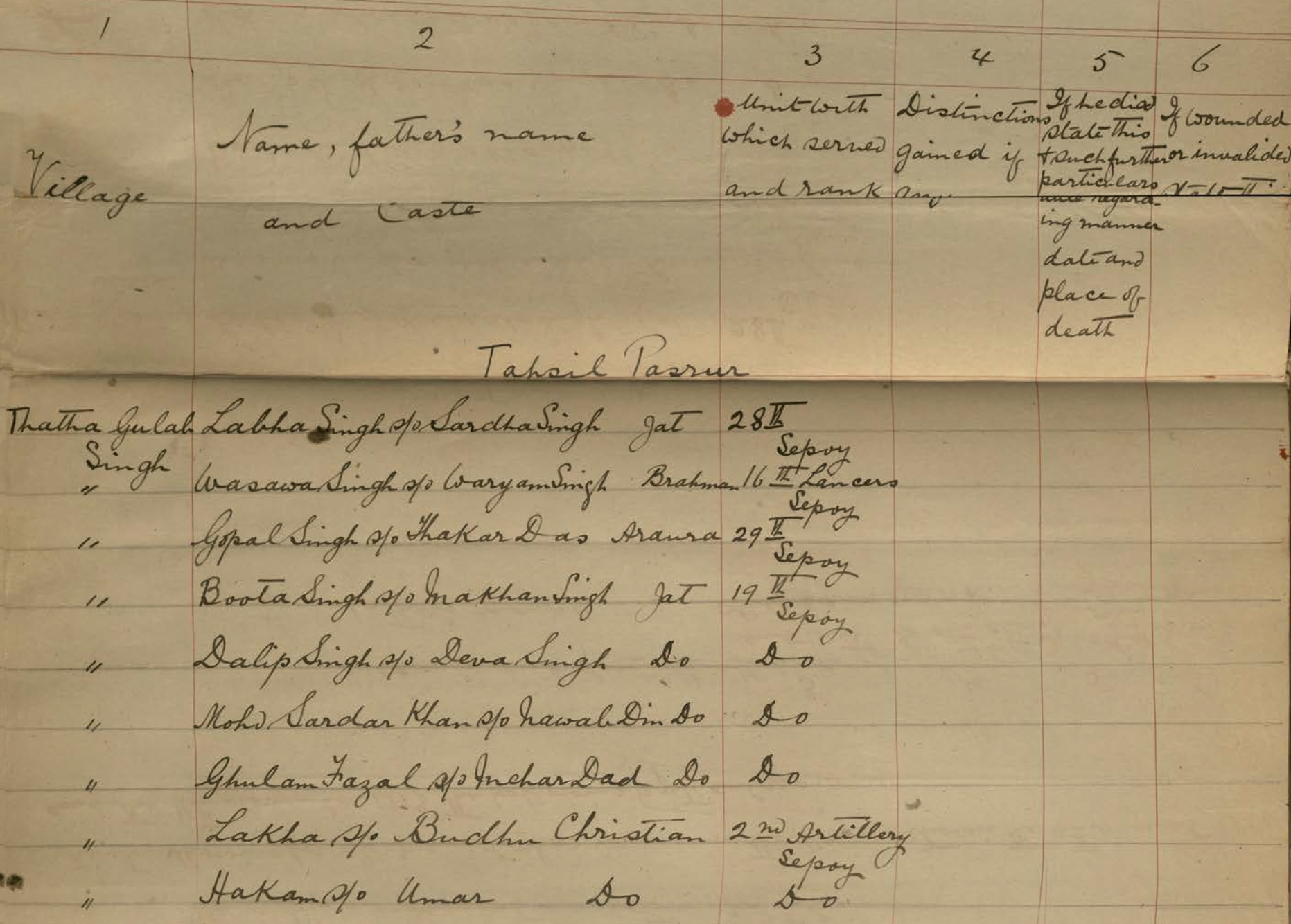Indian families uncover truth about forgotten troops from First World War
A project to digitise records of Indian troops who fought in WWI has offered insight to several Punjabi families, writes Shweta Sharma


A wave of mixed emotions hit Sukhwinder Singh when he opened a rusty chest in his home years ago and discovered a huge circular plaque engraved with the name of his great-grandfather.
“He died for freedom and honour,” reads the memorial plaque with Sepoy Kishan Singh’s name on it.
“It was a feeling of surprise, shock, proud and heartbreak, all at the same time, upon seeing my ancestor’s name etched on the plaque,” Mr Singh told The Independent.
Mr Singh, who lives in Subhana, a town in Jalandhar, some 50 kms away from Sikh majority state Punjab, said he had held onto the “last memory of his great-grandfather” - who had served in the military like many men in his family - without knowing what the plaque was for many years.
“I did not know what it was and never knew what happened to my great-grandfather for decades,” he said.
That all changed when Mr Singh shared a picture of the plaque online and learned the truth courtesy of a group of researchers: his grandfather had served in the First World War.
The bronze memorial plaques - commonly known as a “Dead Man’s Penny” - were sent by the British government to the next of kin of fallen soldiers to show gratitude to their families.

Kishan Singh was one of the soldiers among 320,000 troops from Punjab whose records were found in the registers and files which were discovered lying in the depths of Lahore Museum in Pakistan, having been left unread for a century.
Mr Singh was contacted earlier this year by the members of UK Punjab Heritage Association (UKPHA) who are tracing down the “forgotten war heroes” and digitising these records. The UKPHA published the files last week to mark Armistice Day and ahead of Rememberance Sunday on 11 November.
Amandeep Madra, UKPHA Chair, told The Independent that these “descendants of those who served can fill in some of the gaps” and help piece together stories from WWI.
"Punjab was the main recruiting ground for the Indian Army during World War One, making its contribution as significant as that of Australia. Often referred to as the sword arm of British India its importance in fighting the Great War cannot be overstated,” he said.
“And yet the contribution of its men has largely been unrecognised. In most cases we didn’t even know their names - until now.”
About 45,000 records from three districts have so far been uploaded to the websites, and the aim is to eventually release registers representing an estimated 275,000 soldiers.
The registers were compiled in 1919 by the Punjab government after the war. They contain data on the military service of recruits, and information on their family background, rank, and regiment.
An estimated number of 1.3 million Indian soldiers served in World War One and more than 74,000 of them were killed during and after the war. And yet, the sacrifices of these war heroes have been omitted from or forgotten by history.
Punjabis of all faiths, including Hindu, Muslim and Sikhs, from India’s undivided Punjab made up for a third of the Indian army.
The families of these veterans are now scattered across India and Pakistan after the partition in 1947, when the Brits left India, ending the British Raj. The partition led to one of the biggest migrations in history as millions of families migrated to newly formed Pakistan.

Another family in Punjab’s Dharamkot lost not one but two family members in WWI.
Jaswinder Singh said her grandfather Sepoy Amar Singh, and his brother Sepoy Thakur Singh, who were in the 29th Punjab Regiment, never made it home from the war.
The Singhs fought alongside the British army in Mesopotamia, a region now divided between Iraq, Turkey, Syria and Kuwait, and were killed in action, according to the records found by the UKPHA.
“The actual heroes have been forgotten in history. My dadiji (grandmother) often used to talk about my babaji (grandfather) and used to say why he left me alone here. Both of them were very young when they went to war,” Ms Singh told The Independent.
“My grandfather, Amar Singh, was very respected in the community and he is still remembered in the village by the elderlies who knew him,” she added.
Mr Singh, the descendant of Sepoy Kishan Singh, lamented that two generations of his family - including his great-grandfather, grandfather and his uncles - served in the army and yet little has been done for the birthplaces of the soldiers who sacrificed their lives.
“We are proud of the martyrdom of our ancestors. My uncle was shot 36 times during the India-Pakistan war in 1965, and was given a gallantry award,” he said.
“Now the road to my village is broken and dusty. The little we ask for is development in the village for the better future of our kids.”
Join our commenting forum
Join thought-provoking conversations, follow other Independent readers and see their replies
Comments


Bookmark popover
Removed from bookmarks